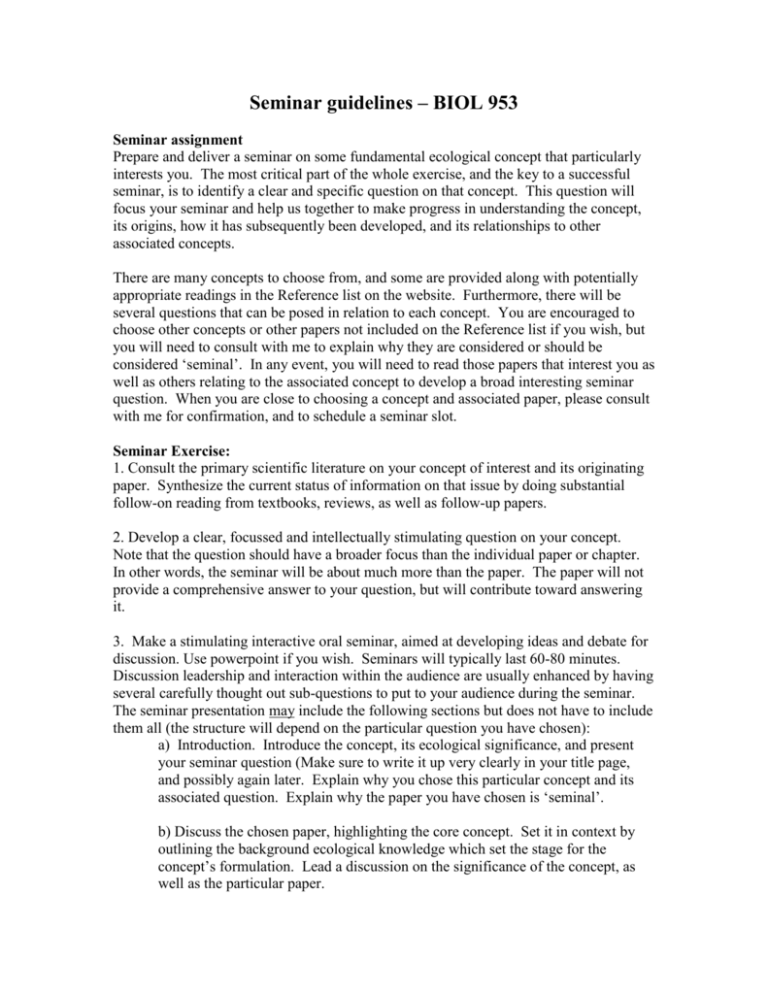Seminar guidelines
advertisement

Seminar guidelines – BIOL 953 Seminar assignment Prepare and deliver a seminar on some fundamental ecological concept that particularly interests you. The most critical part of the whole exercise, and the key to a successful seminar, is to identify a clear and specific question on that concept. This question will focus your seminar and help us together to make progress in understanding the concept, its origins, how it has subsequently been developed, and its relationships to other associated concepts. There are many concepts to choose from, and some are provided along with potentially appropriate readings in the Reference list on the website. Furthermore, there will be several questions that can be posed in relation to each concept. You are encouraged to choose other concepts or other papers not included on the Reference list if you wish, but you will need to consult with me to explain why they are considered or should be considered ‘seminal’. In any event, you will need to read those papers that interest you as well as others relating to the associated concept to develop a broad interesting seminar question. When you are close to choosing a concept and associated paper, please consult with me for confirmation, and to schedule a seminar slot. Seminar Exercise: 1. Consult the primary scientific literature on your concept of interest and its originating paper. Synthesize the current status of information on that issue by doing substantial follow-on reading from textbooks, reviews, as well as follow-up papers. 2. Develop a clear, focussed and intellectually stimulating question on your concept. Note that the question should have a broader focus than the individual paper or chapter. In other words, the seminar will be about much more than the paper. The paper will not provide a comprehensive answer to your question, but will contribute toward answering it. 3. Make a stimulating interactive oral seminar, aimed at developing ideas and debate for discussion. Use powerpoint if you wish. Seminars will typically last 60-80 minutes. Discussion leadership and interaction within the audience are usually enhanced by having several carefully thought out sub-questions to put to your audience during the seminar. The seminar presentation may include the following sections but does not have to include them all (the structure will depend on the particular question you have chosen): a) Introduction. Introduce the concept, its ecological significance, and present your seminar question (Make sure to write it up very clearly in your title page, and possibly again later. Explain why you chose this particular concept and its associated question. Explain why the paper you have chosen is ‘seminal’. b) Discuss the chosen paper, highlighting the core concept. Set it in context by outlining the background ecological knowledge which set the stage for the concept’s formulation. Lead a discussion on the significance of the concept, as well as the particular paper. c) What evidence is used to develop the concept? Describe and explain the main pieces of evidence that are central to formulating the concept. Critically evaluate that evidence – both positive and negative aspects. d) How does the perspective and background of the author influence his/her development of the concept? e) In what ways has the concept been advanced since the original publication? Review the topic and what others have written on it. Also review the author’s more recent writings if appropriate to provide a more up to date perspective on the value of the concept. f) What other concepts have developed since which rely on, or interlink with your chosen concept? g) Summarise your conclusions on the seminar question you have posed. Be sure to include a synopsis of what you have learnt from your seminar audience as well. Seminar convenor: Seminars will be graded (by your audience) according to the following criteria: a) identification of a clear seminar question on your chosen concept b) development of that question during the seminar using evidence from the chosen reading, and other sources c) evidence of independent thinking d) presentation clarity e) enthusiasm and originality f) discussion leadership g) synopsis at the end of the seminar Note the above very carefully. - They tell you what the graders (your seminar audience) will be looking for. Seminar participants: The main objective of this course is to identify and explore the origins and development of a wide range of ecology’s fundamental concepts. The success of the course as a learning instrument will largely depend on the quality of the discussions in each seminar. Please read the paper or chapter circulated prior to each seminar, and come prepared with a typed list of three relevant discussion ideas or questions relating to the reading in the context of the broader seminar question developed by the seminar leader. Hand up your three questions to the seminar convenor at the end of the seminar and he/she will grade them on the basis of their quality (i.e. their perceptiveness and relevance). Finally, note that I am very keen to support individual approaches in this course, so if you have other suggestions of how you would like to do your seminar, please contact me.







